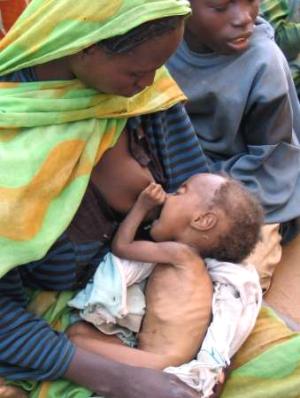Malnutrition rates high in Darfur, aid slow – WFP

GENEVA, June 18 (Reuters) – Thousands of Sudanese children suffer from malnutrition in Darfur, where continued violence and other obstacles are delaying vital food from reaching the hungry ahead of the rainy season, the United Nations said on Friday.
Despite a ceasefire agreed in April between rebels and government forces accused of backing militias blamed for mass killings and looting, a lack of security and checkpoints are slowing aid distribution, the World Food Programme (WFP) said.
“The situation in Darfur is critical…Malnutrition rates are high,” spokeswoman Christiane Berthiaume told a briefing.
The U.N. agency said in June it hoped to feed 800,000 of the 1.2 million people displaced by fighting in the western Sudan region.
The WFP was caring for 1,205 severely malnourished Sudanese children and another 16,132 suffering from lesser degrees of malnutrition at special centres, Berthiaume said.
In Abu Shouk camp, in northern Darfur, overall malnutrition rates are 39 percent, including 10 percent with severe malnutrition, according to the spokeswoman who gave no figure for the camp’s population.
The WFP is now reaching 92 of the 129 camps sheltering people uprooted by the fighting that began in February 2003.
The U.N. refugee agency UNHCR, which is caring for 150,000 Sudanese refugees who have fled to neighbouring Chad, said cross-border flows continue. So far, it has moved 106,000 refugees further inside Chad away from the volatile border.
“We are trying to move as many people as quickly as possible before the rainy season sets in and the entire operation could grind to a halt,” UNHCR spokesman Kris Janowski said.
